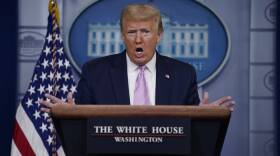EXPLORE MORE
BPR is on tape for the holidays! We'll be back live Monday Jan. 5th
Recent segments
-
Art Caplan: Trump's Defunding Of WHO Is 'Boneheaded'
The World Health Organization is small and imperfect, but it's the world's best bet to monitor the global spread of COVID-19, Caplan said. -
Keith Lockhart Talks Summer Plans For Boston Pops
The conductor said fans can expect a series of ‘Pops at Home’ videos following the suspension of their spring season. -
Trenni Kusnierek Previews The Slow Return Of Sports
The NBC Sports Boston reporter said fans should expect empty stadiums in the months to come. -
John King: Trump's Feud With Governors Is A Waste Of Time
On Monday, President Donald Trump insisted he had the authority to force states to reopen their economies. -
Paul Reville: Distance Learning During The Coronavirus Crisis
The coronavirus pandemic is forcing schools to conduct "distance learning." But online education must be equalized for all school districts, Reville says. -
Anand Giridharadas: Why We Should Be Skeptical About Philanthropy From The Billionaire Class
As Anand Giridharadas sees it, billionaires have spent decades carving out public policy that benefits only them, and hollowing out safety nets for ordinary Americans.
Listen to previous shows
-

BPR Full Show 2/7/23: Peep Show
Today on Boston Public Radio: We opened phone and text lines to ask listeners about their relationship with work commutes, and if they enjoy getting a moment’s rest before and after the workday. Trenni Casey discussed a new study finding evidence of CTE in 92 percent of NFL players, and a story about a Connecticut Whole Foods worker who holds the title of most Mount Everest ascents by a woman. Carol Rose spoke on Massachusetts debuting an abortion resource hotline, as well as a pending lawsuit out of Texas that would ban abortion pills nationwide. Lee Pelton discussed scrutiny of Memphis police in the aftermath of Trye Nichols’ death, and why he’s not concerned with public criticism of the Martin Luther and Coretta Scott King memorial on Boston Common. Corby Kummer reflected on the passing of Bob Born, credited with bringing marshmallow Peeps to the masses. John King gave his two cents on rumors that Labor Secretary and former Boston Mayor Marty Walsh will become Executive Director of the NHL Players’ Association. He also spoke on President Biden’s coming State of the Union Address. We closed the show by re-opening phone and text lines to discuss listener gripes with America’s transition away from cash. -

BPR Full Show: A Political Rematch Nobody Wants
Today on Boston Public Radio: We opened the lines to hear from listeners about a new Washington Post/ABC poll that shows voters unenthused about the prospects of a Biden/Trump rematch in 2024. Jesse Mermell and Jennifer Nassour joined for a political panel, and discussed the DNC voting to move the first primary to South Carolina, and how the Massachusetts Republican party might move forward without Jim Lyons. Mermell is founder and president of deWit Impact Group, and a former Democratic candidate for Congress in Massachusetts’ 4th Congressional District. Nassour is the founder of the Pocketbook Project, former chair of the Massachusetts Republican Party and a former candidate for Boston City Council. Cathy Judd-Stein, Gaming Commission chair, joined to discuss the start of sports betting in Massachusetts. Bradley Campbell, Conservation Law Foundation president and CEO, joined to discuss various environmental headlines, including Gov. Healey’s climate plans. Reverends Irene Monroe and Emmett Price discussed the evolution of the National Prayer Breakfast. Jessie Colbert and Dr. Leena Mittal joined to discuss maternal mental health and perinatal mood disorders. Jessie Colbert is Founder and Executive Director of the Mass PPD Fund. Dr. Leena Mittal, is Medical Director of the Equity, Substance Use and Community Partnerships at MCPAP for Moms, Instructor of Psychiatry at Harvard Medical School, and Chief of the Division of Women’s Health at Brigham and Women’s Hospital. We ended the show by hearing from listeners about the best way to bail on a date that isn't going well, on the heels of a survey that found people generally take 51 minutes to make up their minds and come up with an excuse to leave. -

BPR Full Show: The Unwashed
Today on Boston Public Radio: We started the show by hearing from listeners about how they're preparing for the extreme cold weather expected this weekend. Dr. Katherine Gergen Barnett discussed the Biden administration decision to lift the public health emergency for COVID-19 in May. She is the vice chair of Primary Care Innovation and Transformation in the Department of Family Medicine at Boston Medical Center. Boston Globe business columnist Shirley Leung discussed a legislative push for pay transparency in Massachusetts. Cheryl Straughter, chef and co-owner of the Nubian Square restaurant Soleil, discussed her plans to expand into Boston Public Market, and how the business fared during the pandemic. Sue O'Connell discussed new guidelines from the FDA for gay and bisexual men wishing to donate blood, and the House ousting Rep. Ilhan Omar from her seat on the Foreign Affairs Committee for her statements about Israel. O’Connell is co-publisher of Bay Windows and South End News and contributor to Current, on NBC L-X and NECN. Members of Castle of our Skins, a Boston-based concert and educational series devoted to celebrating Black Artistry through music, joined at the Boston Public Library. Ashleigh Gordon, artistic executive director and co-founder; Samantha Ege, UK-based pianist who collaborated on their new album; musical selections performed by violinists Gabriela Diaz and Matthew Vera, violist Gordon, and cellist Francesca McNeeley. We ended the show with a listener call-in segment about how often to wash jeans. -

Corby Kummer: Is Lab-grown Meat Vegetarian-Friendly?
Food policy writer Corby Kummer joined Boston Public Radio to discuss the ethical considerations behind lab-grown meat for people who consider themselves vegetarians — whether for animal welfare or environmental reasons — off of an article in Mother Jones: “My Vegetarian Dilemma: Tasting Lab-Grown Meat From Live Animals” “This cultured meat is taken from a live animal … and then grown out in a medium,” said Kummer. “Here’s a dirty little secret, almost invariably the medium is fetal bovine serum, FBS, which is taken from dead cows and calves. They never talk about the growing medium.” Corby Kummer is executive director of the Food and Society policy program at the Aspen Institute, a senior editor at The Atlantic and a senior lecturer at the Tufts Friedman School of Nutrition Science and Policy -

BPR Full Show: Are The Parents Alright?
Today on Boston Public Radio: NBC political director Chuck Todd discussed House speaker and Republican representative Kevin McCarthy's recent meeting with President Joe Biden over the debt ceiling, and other national political news. We opened the lines to hear from listeners about a trend away from so-called helicopter parenting, due to parental burnout and a change in ideology. Andrea Cabral discussed 20-year-old Sayed Faisal's death at the hands of Cambridge police. Cabral is former secretary of public safety for Massachusetts and Suffolk County sheriff. Paul Reville discussed whether to bring police back to Boston Public Schools in response to increased violence on school grounds, and the latest on teacher strikes in Massachusetts. Reville is Massachusetts’ former secretary of education and a professor at Harvard University’s Graduate School of Education, where he also runs the Education Redesign Lab. Tech writer Andy Ihnatko discussed artificial intelligence technology's ability to recall images on command, and the Department of Justice's antitrust suit against Google. We re-aired a conversation with comedian and author Jessi Klein about her book "I'll Show Myself Out: Essays on Midlife and Motherhood." We ended the show by opening the lines for another parenting call-in segment: Is it actually a sign of intelligence that your young kid is foul-mouthed?









